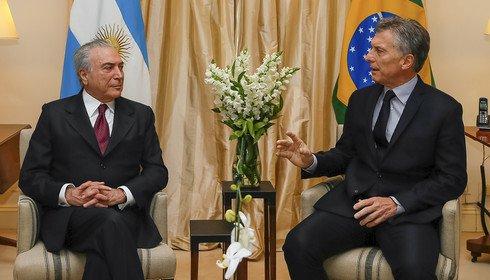Neoliberal Restoration is Stumbling in Latin America
It looked like a done deal. The “populist” governments were to be a brief parenthesis in the continent, running against the global currents.
- Análisis

It looked like a done deal. The “populist” governments were to be a brief parenthesis in the continent, running against the global currents. In the right wing and the ultra-left, the analysis was ready: “the end of the cycle” of the anti neoliberal governments.
Serious problems in Venezuela, electoral defeat in Argentina, a reversal in Bolivia, a coup d’état in Brazil, among others, were considered a forecast that the right would return. The announced neoliberal restoration took shape in Argentina with the new government of Mauricio Macri and in Brazil with Michel Temer. The right was preparing to celebrate victories in Ecuador, in Chile, in Mexico, in Colombia, possibly even in Bolivia, among other countries of the continent. The United States was proclaiming that their period of greatest isolation in Latin America was ending.
Those who were uncomfortable with the governments that had achieved the most successes in the continent, but that did not correspond to their erroneous predictions, reappeared, after having been absent, without any discourse at all. They were the most brash in foreseeing “the end of the cycle” of governments that negated everything that they have said. Relieved, they could return to their old and unworkable academic theses.
But things have not evolved as the conservatives had foreseen. Neither the governments of Macri nor Temer are managing to achieve what they had promised, nor in other countries does the panorama correspond to what the right was hoping for.
The models of neoliberal restoration put into practice in Brazil and Argentina have neither reestablished economic growth nor have they overcome the crisis. The recession continues and intensifies in these countries, unemployment has reached new records, the social situation is deteriorating and support for these governments has fallen, to the point where the government of Temer has less than 5% support.
It is now apparent that the old project, already applied in the 1980s and 1990s in various countries of the region, is incapable of providing a solution to the problems of these countries. On the contrary, reducing state investments and resources for social policies, and cutting back workers’ rights has only intensified the crisis. The neoliberal restoration is ending in failure.
On the other hand, the Venezuelan crisis, in the face of the corrosion of the methods of action of the opposition and the disastrous threats of Trump, and given the election of a Constituent Assembly, has also generated a situation of crisis for the opposition. Their demonstrations have been toned down, confusion abounds in their ranks.
In countries such as Mexico, Colombia, and Chile, meanwhile, the left has real possibilities of victory in the upcoming presidential elections. Andrés Manuel López Obrador appears to be the favourite in the surveys, while the traditional parties of the right, PRI and PAN have difficulties even in their interior unity and are launching competing candidates.
In Colombia, Gustavo Petro, former mayor of Bogotá, in competes for leadership in the opinion polls with the best known right wing candidate, Vargas Peñaloza, while the party of Uribe is looking for a name, in the midst of the paralysis of support for the ex-president, who for the first time has an index of rejection higher than that of support.
In Chile, where the right was preparing to celebrate the return of Sebastián Piñera, in the face of the incapacity of the Bachelet government to even name a candidate, the Frente Amplio is developing a significant campaign with the candidacy of Beatriz Sánchez, a renowned leader of the education sector in the country, who is now in second place in the polls.
In Ecuador, even with the narrow result achieved, the problem does not come from a return of the right, but of dissensions within the government of Lenin Moreno and of the Alianza País party. Conflicts that are certainly a concern, even more so with the tone assumed in the mutual reproaches. But these are differences within the same process.
In Bolivia, now that the farce of personal accusations against Evo Morales have been shown to be a complete fabrication of the opposition, the MAS is preparing to find a way to present the candidature of Evo once again, thanks to the massive support of the people for his government.
The growth of the counteroffensive of the right is being reversed; it has lost momentum and has not produced any new proposals that could really configure the end of a cycle, surpassed by a new historical period. They are attempts to return to the old neoliberal model that, neither in Latin America, nor in any other place, has presented the capacity to overcome the generalized crisis in which this same model has left the great majority of the economies of Europe, the United States and Latin America.
It is from the new forces that have led the extraordinary process of struggle against neoliberalism that new perspectives could emerge, and take up and give continuity, in new historical conditions, to this process.
(Translated for ALAI by Jordan Bishop)
- Emir Sader, Brazilian sociologist and political scientist, is the Coordinator of the Laboratory of Public Policy of the State University of Rio de Janeiro.(UERJ).
Del mismo autor
- Hay que derrotar políticamente a los militares brasileños 07/04/2022
- China y Trump se fortalecen 04/03/2022
- Pandemia e Ucrânia aceleram decadência da hegemonia norte-americana no mundo 28/02/2022
- Pandemia y Ucrania aceleran la decadencia de la hegemonía norteamericana en el mundo 28/02/2022
- La anti-política generó la fuerza de extrema derecha 22/02/2022
- Las responsabilidades del PT 10/02/2022
- Estados Unidos, más aislado que nunca en América Latina 03/02/2022
- Memoria y olvido en Brasil 27/01/2022
- 2022: tiempos decisivos para Brasil y Colombia 05/01/2022
- Brasil: una historia hecha de pactos de élite 18/12/2021
